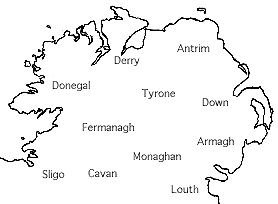
The following is a brief summarisation of the British Army / RUC Military
Bases, Barracks, & Out Posts in the immediate South Armagh Area. All are
heavily fortified with surveillance and infra red camera equipment. All the
bases detailed below contain purpose built helicopter landing pads.
Cloughogue VCP on main Newry / Dublin road.
Two Look Out Posts situated on Cloughogue mountain. Permanent vehicle
checkpoint with search centre was removed on week commencing 8th December 1997
so as to facilitate the DOE road service. However, still manned by British
Army/RUC. Some 30 surveillance & infra-red camera's have been erected in
addition to those already present.
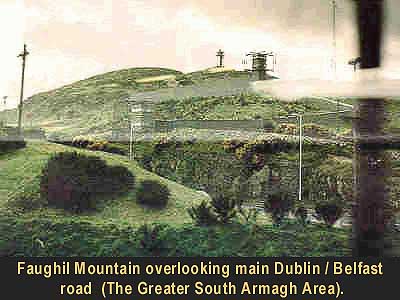
Three Look Out Posts situated on Faughil mountain which take up approximately
25 acres of land. Some 29 surveillance & infra-red cameras erected, with 14
cameras permanently trained on the inhabitants in the South of Ireland, with the
remaining 15 trained on the people of South Armagh. Raw sewage seeps freely down
the mountain side into streams, which flows into rivers etc. Water is used for
human consumption. Prior to cease-fire, there was only one small Look Out Post.
Would now be considered the largest Look Out Post site in South Armagh.
Massive joint British Army/RUC barracks purposely built adjacent to Forkhill
Primary school. Cargo being carried by British Army/RUC helicopters, has fallen
onto school playground, in the past. Two Look Out Posts on Carrive mountain with
surveillance cameras. Two Look Out Posts & large military base on
Carrickasticken mountain. Again, raw sewage seeps freely from the later
base.
(These military installations are all in a 1 mile
radius of each other.)
Forkhill Village
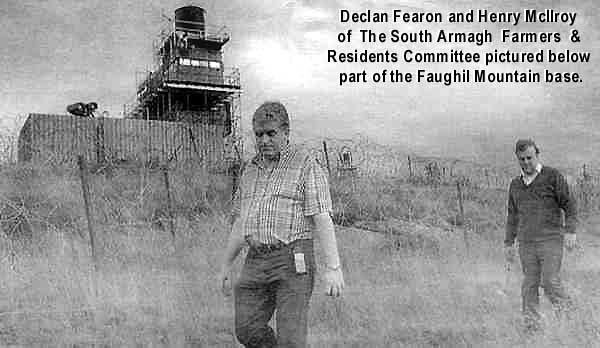
Glassdrummond Base
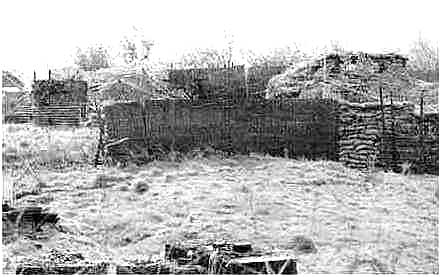
Two large Look Out Posts situated on 30 acres of prime land which was
confiscated from the owner in May 1986. Again, many surveillance & infra-red
cameras erected, with two at road. As early as March 1999, refurbishment &
expansion was being carried out at this site by the British army. In the past,
there has also been problems with raw sewage, similar to that as
above.
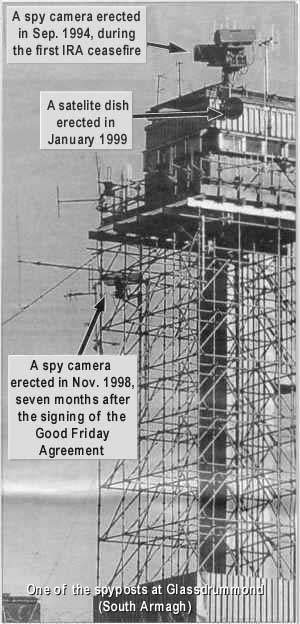
Drumuckavall Hilltop
One large & one smaller Look Out Post erected practically on the South
Armagh & Louth border, not any more than 100 yards from an elderly couples
home. An elderly widow living on her own was forced to leave her property
several years ago, due to continued seepage of raw sewage, which still persists.
Again, many surveillance & infra-red cameras installed. Major enhancement
work has been carried out, off late.
Crievekeeran Hilltop
Again, one large & one smaller Look Out Post erected on prime farm land
confiscated from its owner in May 1986. Again, seepage of raw sewage evident,
& enhancement work has been ongoing for several months now. The owner of the
property has had to seek alternative employment, due to his farmland being
deceased by 15 acres.
Crossmaglen Town
Massive joint British Army/RUC military barracks built in centre of
Crossmaglen town, adjacent to private homes, Crossmaglen GFC grounds & St
Josephs High school. The base is actually adjoined onto one home-owner's private
property. Other home owners have had large parts of their gardens confiscated so
as to accommodate the building of this fortified base. Four Look Out Posts
attached to the barracks. Land belonging to the Crossmaglen Rangers Club was
also confiscated some 27years ago, and too date is still retained by the British
Army & the RUC respectively. This has greatly effected the development of
the GAA Club & its grounds. 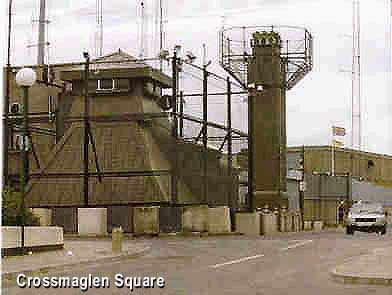 Lislea Mountain
Lislea Mountain
Two large Look Out Posts dominate this mountain top. Again, since the
cease-fire, major work has been carried out, greatly increasing the size of this
base. Nestled below this monstrosity is the Lislea Catholic church and
homes.
Camlough Mountain
Three large Look Out Posts are situated on this picturesque
siting overlooking Camlough village & Camlough lake resulting in tourism
potential being thwarted. As late as March 1999, major refurbishment was being
carried, increasing the base by 30%. Extra surveillance & Infra-red cameras
have also been erected.
 Bessbrook Village
Bessbrook Village
Bessbrook village reputedly, houses the largest British
military barracks with the busiest helicopter port in Western Europe. This base
is nestled in the centre of Bessbrook, surrounded by homes, schools, an Old
People's home, in addition to private homes. This base is jointly operated &
manned by the British Army & the RUC. Whilst the permanent vehicle check
points, on all five roads leading into Bessbrook were removed in January 1999,
this has resulted in intensified foot-patrolling & Landrover activity in the
village. The stopping & searching is now at an all time high. Upwards on a
thousand surveillance & infra-red cameras cover the entire village, with
extra cameras having been installed quite recently.
 The British Army
The British Army
in Northern Ireland
MILITARY OPERATIONS
(Source: UK Ministry of Defense)
| |
The Army's presence in support of the RUC can take many forms, all of which interlink, and are coordinated with the RUC. These include foot patrols, mobile patrols and patrols inserted by helicopter, aerial observation, snap vehicle checkpoints, patrol bases and observation posts.
Many of these duties involve the Army in supporting and protecting police officers in their daily tasks. These can range from large-scale operations such as those involving the police anti-racketeering squad, to providing protection for refurbishment work on police stations and army bases as well as everyday tasks such as serving summonses and community policing. Cross border liaison is the responsibility of the RUC and Gardai.
VEHICLE CHECKPOINTS AND PATROL BASES. In addition to the patrols which deploy by foot and helicopter in the border area, the Army maintain Patrol Bases close to the border. These form another strand in the policy of deterring or apprehending the terrorist. The Bases offer increased security for the soldiers within them, and provide secure locations from which to mount patrols. All border crossing points have been re-opened since the IRA ceasefire in 1994, and remain so today.
OBSERVATION TOWERS. The military have constructed a large number of observation posts and towers throughout the province which provide the security forces with another means of deterring and detecting the movement of terrorists. The height of the towers provides the security forces with the ability to observe movement over a wide area.
High technology vision aids, such as image intensifiers and infra-red (IR) light (ordinary white light with IR filters added), give the soldiers in these towers and other observation posts a very effective day and night observation capability.
The relatively small number of trained soldiers needed to man the towers can, in the carefully selected areas they have been placed, provide a more effective coverage of an area than patrols alone.
NAVAL PATROLS. The Royal Navy extends the principle of patrolling the border areas to Northern Ireland's coastal waters and to those of Carlingford Lough and Lough Foyle. Regular seaborne patrols are mounted in these waters and close relations maintained with the RUC in order to prevent Loyalist or Republican terrorists moving arms and personnel into Northern Ireland by sea. Such co-operation can be in the form of combined operations; for example, RUC officers landed by the Royal Navy on the coast or offshore islands in order to conduct searches for terrorist weapons.
Source: UK Ministry of Defense
 MORE OFFICIAL INFORMATION MORE OFFICIAL INFORMATION
|
Newtownhamilton Town
Large joint British Army & RUC barracks erected in centre
of town amid homes, shopping area & schools etc. Currently being re-built,
with large Look Out Posts adjacent.
Keady
A new large joint British Army & RUC barracks replaced the
previous one, last year. Two Look Out Posts with surveillance & infra-red
cameras erected surround same.
Middletown
Joint British Army & RUC barracks erected in the town of
Middletown, which straddles the Louth Armagh & Louth border. A purpose built
search centre is in operation. Look Out Posts surround the barracks, search
centre, with an additional one erected on a hill overlooking the area.
Helicopter Flights
Mr Henry McElroy, a prominent committee member has recorded
3,789 helicopter flights into the Glassdrummond Look Out Post alone, since the
second IRA cease-fire, 20th July 1997. There has been as many as nine
helicopter's in the air at any one time. Despite Ronnie Flanagan's, & Mo
Mowlam's statement that only one helicopter is in the air at any one time, today
, in South Armagh, as many as five will fly together.
Expenditure Budget allocated to the "Security Forces"
The expenditure allocated to the security forces for year
ending July 1998 was £1,435 million. This does not include the wage roll for the
RUC that has been disclosed at £658 million. A projected figure of £1,430 has
been allocated for the forthcoming twelve months. Since August 1997, £76 million
has been spent on building & re-building new Army/RUC barracks, throughout
the North of Ireland, & refurbishing & expanding the Look Out Posts,
some which have increased on upwards on 50% in size, particularly in the South
Armagh area. Figures released, determine that a further £59 million has been
allocated for the forthcoming twelve months. This is the response from the
British Government, the British Army, the RUC and the Northern Ireland Office to
the cease-fire, the signing of the Good Friday Agreement and the current Peace
Talks process.
Source:
South Armagh Farmers & Residents Committee
www.freespeech.org/safrc/bases.html |



